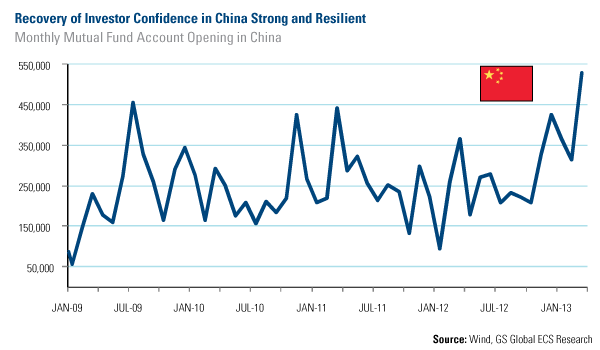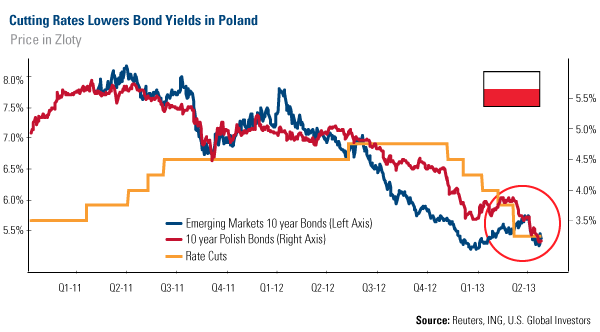Emerging Markets Radar (April 29, 2013)
Strengths
- The Hang Seng Index was up 2.43 percent this week, driven by better than expected first-quarter earnings announcements from H-share banks, IPP, auto, telecom, home appliances and property developers. Investors also may have been encouraged by attractive valuations of H-share stocks in general.
- Domestic airlines in China booked a combined profit of more than Rmb 500 million, compared with a loss of Rmb 130 million a year earlier.
- The Philippines cut the Special Deposit Account (SDA) rate by 50 basis points to 2 percent, while keeping the overnight benchmark rate and lending rate unchanged at 3.5 percent and 5.5 percent, respectively. This is the third-consecutive SDA rate reduction to help credit expansion. The Philippines stock market, PCOMP Index, established another milestone on Monday as it closed above the 7,000 mark. The stock market is also supported by higher GDP growth, growing remittance, growing business process outsourcing, double-digit earning growth, high-loan growth, private public partnership projects, loosening monetary policy, merger and acquisition activities, and rising assets under management of local funds. However, the popular stocks are no longer cheap.
- Hong Kong exports grew 11.2 percent in March, versus the consensus of 9.3 percent. Total exports to Asia grew by 15.8 percent on a year-over-year basis. While exports to the U.S. grew by a modest 0.4 percent, exports to the U.K. and Germany fell by 26.6 percent and 14.7 percent, respectively, showing weak markets in developed countries.
- Korea’s first-quarter real GDP grew 0.9 percent quarter-over-quarter and 1.5 percent year-over-year, stronger than market expectations of 0.7 and 1.4 percent, respectively. Manufacturing, construction and services sectors expanded sequentially.
- Thailand’s March exports rose 4.55 percent versus the consensus of 2.34 percent, and better than a 5.83 percent drop for the previous month.
- S&P upgraded the rating of Colombia’s sovereign debt from BBB- to BBB. Deutsche Bank reports the rating change is justified by an improved sovereign creditworthiness, explained by a stronger fiscal profile, deeper capital markets and favorable long-term prospects. The rating agency also commented on potential future upgrades as peace negotiations progress could result in significant decreases in violence, as well as improved security. This new rating places the country in line with its peers Brazil, Mexico and Peru. The news is expected to increase foreign direct investment into the country.
- Turkey continues to be a magnet for foreign direct investment. The country’s appeal was reiterated this week when in a surprising move, Texas-based Airport Development Corporation (ADC) and airport operator Houston Airport System (HAS) announced a joint bid for the New Istanbul Airport project to be tendered on May 3. ADC and HAS were responsible for the Ferenc Lizst Airport in Budapest, as well as the Lester B. Pearson Airport in Toronto. The bid for the 7 billion euros project will be submitted jointly with an unspecified Turkish partner.
Weaknesses
- HSBC’s April China flash PMI was 50.5 versus the market estimate of 51.5, indicating the economic growth recovery is in process, but is weak.
- The China Banking Regulatory Commission’s (CBRC) chairman Shang Fulin was quoted as saying non-performing loans will keep rising, but hidden loans are expected to pose a much bigger challenge for banks.
- The Taiwan March industrial output posted a 3.28 percent decrease in March due to a downside surprise in export orders of negative 6.6 percent year-over-year. March commerce sales were weak as well, at negative 0.7 percent.
- The Brazilian central bank came short of market expectations of a 50 basis point increase in the lending rate at its April meeting. Central bank chief Alexandre Tombini announced a 25 basis point increase to the SELIC rate, which did not satisfy analysts who remain highly concerned with March inflation breaking through the tolerance ceiling of 6.5 percent. Analysts are now focusing on the central bank’s policy meeting in May for the additional 25 basis point increase, while carefully monitoring for a spill-over economic slowdown effect on the already ailing economy.
- In Hungary it appears the Viktor Orban-induced record central bank rate cuts are no match for the weakening Hungarian labor market. Despite limited success on the PMI front, the Hungarian economy has begun to show stronger signs of European weakness contagion. Industrial production was down 1.1 percent, economic confidence dropped by 21.7 points, and the unemployment rate reached 11.8 percent, just shy of its all-time high in March 2010.
Opportunities
- As shown in the graph above, Chinese investors are actively opening new accounts, which might indicate those investors’ intentions of bottom-fishing in the A-share market. The Shanghai Stock Exchange Composite Index is currently priced at multiples that are at its historical lows.
- Venezuelan President Nicolas Maduro announced Tuesday his decision to name National Assembly representative Calixto Ortega in charge d’affairs for Venezuela in the United States. The head of state said that the Venezuelan government wants to have the best possible relations with all governments around the world, including the United States. We believe the new appointment opens the opportunity to improve communications and trade relations among the two countries, while at the same time helping to heal the diplomatic relations that have been strained since 2008.
- Poland is likely to continue the monetary easing it started during the last quarter of 2012. The weak monthly activity data for March, a recent downward revision of the 2012 fourth-quarter GDP, as well as the weakening of growth expectations in Germany and the eurozone, have led analysts to suggest a 25 to 50 basis point cut during the monetary policy committee meeting next month. The chart below shows how the last 50 basis point cut in March finally aligned the Polish sovereign 10-year yield performance with the performance of its emerging market counterparts. We expect a May cut to provide more support to the economy and lead Poland to outperform its peers.
Threats
- China is ending its 20-year cycle of fast growth, which is characterized by manufacturing expansion, international trade growth, and infrastructure build-up. While China will maintain an annualized GDP growth rate of 7 percent, the transition of a growth model toward value-added manufacturing, consumption and services can have many uncertainties for the equity market.
- On Wednesday, Mexican president Pena Nieto suspended the presentation of his financial reform to congress, citing differences with opposition parties. The office of the president noted a new negotiation phase would improve communication with other parties and reinforce the Pact for Mexico coalition. However, the truth behind the matter, according to Deutsche Bank, is not related to the reform itself, but rather to a corruption scandal tarnishing the political campaign ahead of the Veracruz state election next July where opposition parties have accused Pena Nieto’s government of using fiscal spending for electoral purposes. The impasse is likely to be resolved, but it will certainly strain relations within the coalition, cause political casualties, and involve greater execution risks and delays on the reform front.
- With the country struggling to rein in inflation and revive the economy, Russian president Vladimir Putin said he may limit rises in gas and power tariffs to 6 percent, instead of the previously planned 9 to 10 percent. The news is negative for state-owned gas company Gazprom and the Federal Grid Company (FSK), because the lower tariff growth would negatively affect margins and profitability. Furthermore, Putin implied that the Russian Federation will not cut rates to revive the economy; instead he will pressure banks to lower their lending rates, which he considers overexaggerated. The move will compress the banks’ net interest margins and erode their profitability.













